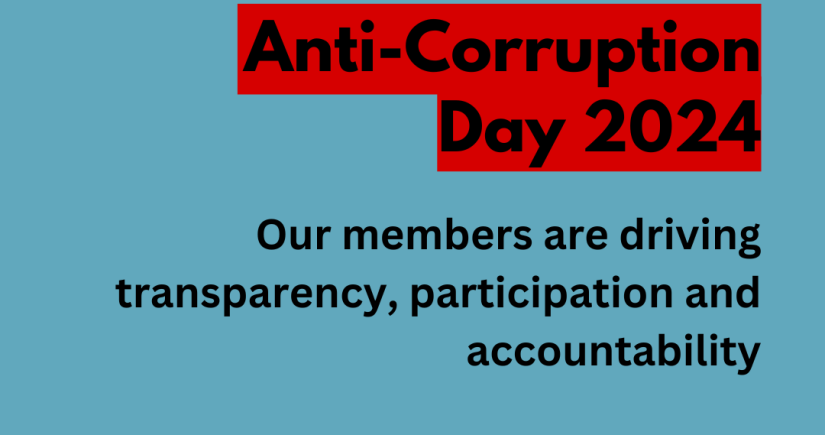Today marks Anti-Corruption Day, a United Nations Awareness day. Some of our members are marking this day by sharing their experiences of corruption in infrastructure, and how they’re deterring corruption using the CoST approach and tools.
There were commonalities between members in the challenges in their cities and countries, and the methods they’re using to achieve success in tackling this issue. Their answers focused on the significant need to improve transparency, participation and accountability in tandem to reduce corruption.
Our members highlighted how corruption impacted transparency and accountability. Project time and cost overruns was a challenge recognised by CoST Ethiopia. This was also noted by CoST Ecuador, alongside reduced quality in infrastructure projects, and the importance of contracting processes being open and competitive to tackle anti-corruption. The public sector and government having a more active role in tackling corruption was acknowledged by CoST Bogota, CoST El Salvador, CoST Uganda and CoST West Lombok.
Several members discussed the link between corruption and (lack of) participation. CoST Ecuador’s multi-stakeholder group said “involving citizens through tools such as open portals or social oversight can be key to ensuring that investments really respond to collective needs.” CoST Bogota’s manager, Carolina Gaez echoed a similar sentiment, noting that “Little participation generates apathy in the citizenry,” as did CoST Uganda.
CoST Malawi’s manager, Lyford Gideon, reflected on citizens being “unable to demand better value from investments made into public infrastructure… people seem not to realise the rights they have to demand for infrastructure accountability from duty bearers.” CoST West Lombok’s manager, Imam Arief Putrajaya, also faced this issue, expressing “public interest is largely dormant, surfacing only when corruption scandals come to light.”
CoST Costa Rica thought about how participation could be improved across society to tackle corruption. “There should be more awareness campaigns to mitigate and eradicate corruption. The issue of ethical, moral and civic values should be addressed from childhood, in schools, young people should be trained in models of collaboration.”
These members, and more, are actively working on increasing participation to reduce and deter corruption, using the CoST approach, and tools and standards.
Many of our members are using open data platforms, or in the process of creating them. Carolina’s reflections on CoST Bogota creating a platform highlights a common importance: open data platforms “allows the dissemination and collection of useful information for citizens and value groups in a single place.” CoST Ecuador is using an open data platform that disseminates on Ecuador’s public procurement processes, as well as a tool, Transparent Contracts which has 26 red flags or indicators that detect suspicious behaviour in public procurement. CoST West Lombok has established INTRAS (Infrastructure Transparency Portal). CoST Uganda has created a data dashboard to “facilitate real-time monitoring of project implementation and inform decision-making by responsible accounting officers.”
CoST Ethiopia and CoST Malawi are working on the creation of open data platforms, based on the OC4IDS. Costa Rica is working on a platform, with multi-stakeholder working at its heart. “We seek to promote Costa Rican institutions and municipalities participating and publishing data standardised by OC4IDS.” A similar sentiment was highlighted by CoST Ecuador, with the aim of their transparency platform being to “provide various stakeholders, such as citizens, authorities, civil society, academia and companies, with access to relevant and up-to-date information on infrastructure projects. This platform will allow for greater control and monitoring of projects, encouraging active participation and citizen oversight. In the future, this tool is expected to become a benchmark for good practice for the region, allowing for the exchange of challenges and experiences.”
The important link between tools and standards, with social accountability has included the Infrastructure Transparency Index (ITI). CoST El Salvador used their results to attract attention from press, multilateral organisations and information officers of government entities. Costa Rica used the 2021 and 2023 ITIs to highlight challenges around the publication of information and have raised awareness among public officials about “the vital importance of their role in publishing public data proactively and thus making procedures transparent.” CoST Uganda used the ITI to help highlight corruption.
CoST Malawi and CoST Ethiopia have worked with governments to ensure change. CoST Malawi has secured high level political buy-in, with the President of Malawi working as CoST Champion. The Ethiopian government has used results from CoST Ethiopia’s independent review process to make decisions on contracts. Meanwhile, CoST West Lombok has also influenced other regions in Indonesia to become CoST members.
Other methods highlighted included training and independent review processes by CoST El Salvador; influencing policy reforms, including law amendments and guidelines by CoST Uganda; establishing formal requirements for the publication of data by CoST West Lombok and CoST Malawi; multi-stakeholder working by CoST Costa Rica and a long term public policy of Integrity, transparency and fight against corruption by CoST Bogota.
Looking ahead to the future of anti-corruption, our members are building on their successes, continuing to use the CoST approach and tools, including open data platforms. CoST Ecuador is working on another transparency platform; CoST El Salvador is building alliances, particularly focused on citizen oversight; CoST Costa Rica will be publishing their third ITI; CoST Ethiopia is working on a website and further independent review of projects; CoST Malawi and CoST Uganda is working on building capacity of CSOs and media institutionalising CoST principles; CoST West Lombok will be strengthening the publication of data and influencing government; CoST Uganda will be integrating the OC4IDS in government procurement, strengthening the publication of data and strengthening capacity of public officials.
This Anti-Corruption Day, and beyond, we’re proud of the work of our members in deterring corruption to support the delivery of quality infrastructure that improves lives and strengthens economies. Thank you to Geoffrey Odong; Imam Arief Putrajaya; Lyford Gideon; CoST El-Salvador’s MSG; Muhammed Kassaw; Andrés Altamirano and Carolina Gaez for sharing their thoughts, reflections and successes with us.
